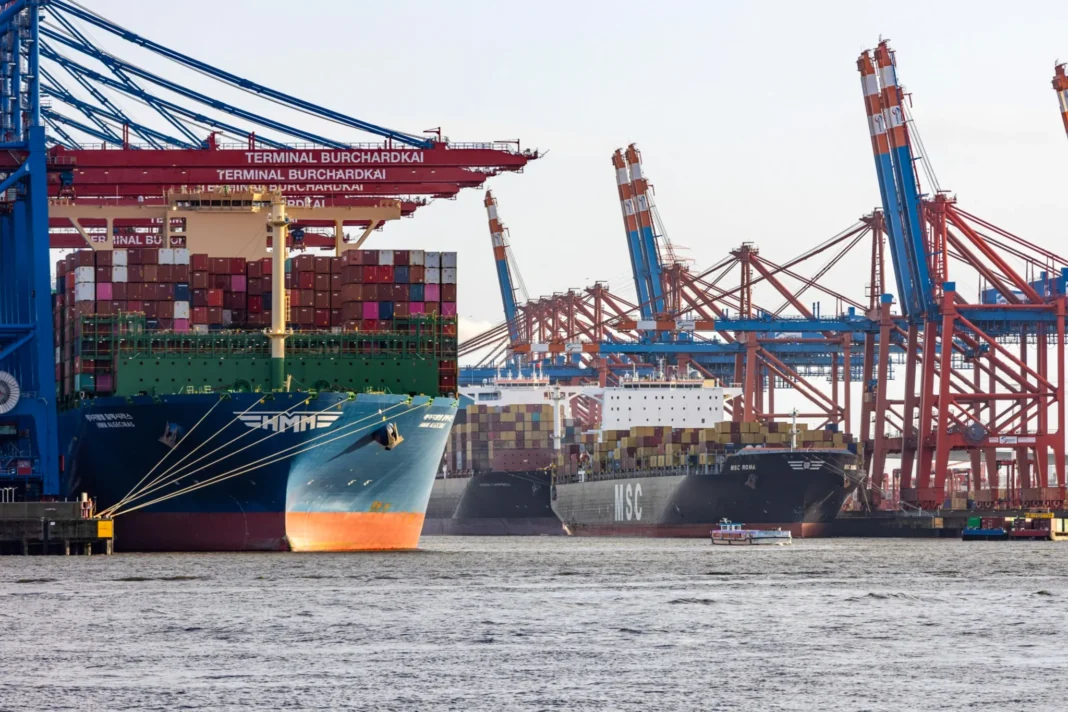In the first half of 2024, the United States surpassed China to become Germany’s largest trading partner, according to preliminary data from Germany’s statistics office. This shift underscores Berlin’s strategy to reduce its reliance on Beijing amid ongoing geopolitical tensions and economic uncertainties. From January to June 2024, trade between Germany and the US reached approximately 127 billion euros ($139 billion), while trade with China amounted to around 122 billion euros. This marks a significant change from previous years when China consistently held the top spot as Germany’s foremost trading partner, a position it retained for eight consecutive years until the end of 2023.
According to preliminary data from Germany’s statistics office, the United States has surpassed China to become Germany’s largest trading partner in the first half of 2024. This shift underscores Berlin’s ongoing strategy to reduce its dependence on Beijing amid persistent geopolitical tensions and economic uncertainties. From January to June 2024, trade between Germany and the US has overtaken that with China. This major shift is attributed to the strategic distancing between Germany and China, resulting in the US becoming Germany’s largest trading partner after nearly a decade. This represents a significant departure from previous years when China consistently dominated as Germany’s leading trading partner, holding the position for eight consecutive years until the end of 2023. The change in trade dynamics highlights Germany’s strategic pivot away from China, driven by political disputes and concerns over what Berlin describes as “unfair practices” by Beijing.
Preliminary data from Germany’s statistics office reveals that in the first half of 2024, the United States has overtaken China as Germany’s largest trading partner. This shift highlights Berlin’s ongoing efforts to reduce its reliance on Beijing amid persistent geopolitical tensions and economic uncertainties. From January to June 2024, trade between Germany and the US has surpassed that with China. This significant shift is attributed to the strategic distancing between Germany and China, resulting in the US becoming Germany’s largest trading partner after nearly a decade. This marks a notable departure from previous years when China consistently held the top spot as Germany’s leading trading partner, maintaining the position for eight consecutive years until the end of 2023. The change in trade dynamics underscores Germany’s strategic pivot away from China, driven by political disputes and concerns over what Berlin describes as “unfair practices” by Beijing.
The shift is also evident in import patterns. German imports from China dropped by nearly 8%, amounting to 73.5 billion euros. In contrast, imports from the US fell by 3.4% to 46.1 billion euros, supported by the supply of energy commodities. Machleid emphasized the uncertainty in future trade patterns, pointing out that geopolitical instability and fluctuating economic conditions in the US, China, and Germany make it difficult to predict how these trends will develop.
For decades, Germany and China have enjoyed a robust economic relationship, marked by a significant increase in bilateral trade and considerable investments from German manufacturing companies into China, the world’s second-largest economy. Since 2016, China has held the position of Germany’s top trading partner, reflecting the deepening economic ties between the two nations. Germany has played a pivotal role in facilitating trade between China and the European Union. However, the competitive landscape has evolved.
Escalating geopolitical tensions, increasing compliance costs, and China’s policies favoring its domestic businesses have led Berlin to reassess and reduce its dependency on Beijing. In 2023, the German government introduced its first national strategy on China, labeling the Asian superpower as a “partner, competitor, and systemic rival.” This strategy aims to decrease Germany’s reliance on Chinese goods while maintaining the substantial economic ties worth hundreds of billions of dollars.
The policy includes measures such as export controls and investment screenings for German companies operating in China to protect sensitive technology and intellectual property. However, the strategy lacks details on how Berlin will manage Chinese investments in Germany, raising concerns. German businesses in China face numerous challenges, including increasing competition from local firms, uneven market access, economic uncertainties, and geopolitical risks.Moreover, Chinese companies have become increasingly competitive, especially in the industrial and automotive sectors, setting higher standards for German firms. Despite these challenges, major German corporations continue to invest significantly in China to maintain their market presence and mitigate the impact of growing geopolitical tensions. A report by Allianz Trade in April highlighted that, despite the difficulties, China remains an attractive investment destination for large German corporations. The report noted that direct German investment in China increased five-fold from 2010 to 2022, indicating sustained interest despite a more challenging environment.China is expected to remain a vital economic partner for Germany in the foreseeable future. The profits generated by German companies in China will continue to support employment in Germany, providing a buffer during the anticipated challenging transition towards a greener economy.

